The Supreme Court has directed the Election Commission of India (ECI) to file a short affidavit within three weeks on a Public Interest Litigation (PIL) challenging its decision to increase the number of voters per polling booth from 1,200 to 1,500. The bench headed by CJI Sanjiv Khanna, along with Justice Sanjay Kumar, passed the order.
Senior Advocate Maninder Singh, appearing for the ECI, told the court that the revision was made in 2019 and that the exercise since then was perfect. “The increase to 1,500 voters per booth has been in effect since 2019 and so far, it has been smooth sailing with no complaints or issues,” said Singh. He also maintained that political parties are consulted before a decision is taken in regard to the election process.
However, the Chief Justice Khanna shared his apprehension that voters will be inconvenienced and asked the ECI to file an affidavit explaining the situation. Singh agreed and shared that the ECI would not want to inconvenience any citizens in their voting process.
The bench asked if the ECI had indeed increased the number of voters at polling booths. Singh said that it had, and that 1,500 voters per booth was well within the technical capacity of the Electronic Voting Machines (EVMs). He said that if the number of voters exceeds this limit, pre-poll consultations with political parties are held in each constituency to manage the process.
Singh also mentioned the allegations against EVMs, stating that since the voting technology is constantly upgrading, such allegations would continue to be made. He further clarified that queues occur only late in the day, after 3 pm, but those already in line by 5 pm will be given an opportunity to vote.
Justice Khanna raised a question about the term “polling booth,” whether that refers to one EVM or multiple booths at a polling station. The honourable judge asked Singh to clarify this point in the affidavit.
The PIL, filed by social activist Indu Prakash Singh, argued that increasing the number of voters per booth could lead to longer queues, which might deter the underprivileged if they cannot afford the time to wait.

